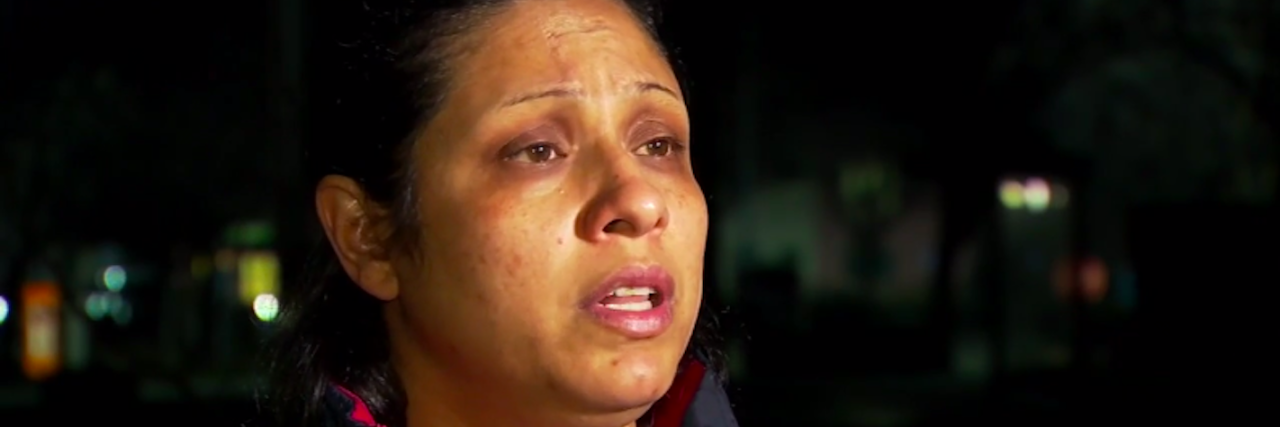Police Try to Arrest Autistic Teenager After Seizure Instead of Providing Medical Service
A 16-year-old autistic teenager is recovering in the hospital after police responded to an emergency call for medical help by handcuffing and attempting to arrest him immediately following a seizure, even while he vomited.
Lourdes Ponce, the teenager’s mother, shared video footage of the incident with ABC30 in Fresno, California. Ponce, her 16-year-old son, and daughter were dining at a fast food restaurant after coming from the doctor to address her son’s epileptic seizures. While the 16-year-old was in the bathroom, Ponce stood outside to monitor his safety when she said he had another seizure.
“I stood outside the door, I heard him hit the floor, I tried to open the door but it was locked, that’s when I asked for help,” Ponce told ABC30. Restaurant employees unlocked the bathroom door, where her son was on the floor. Ponce told her daughter to call for emergency medical support.
Instead, Fresno Police officers arrived on the scene and tried to handcuff the teenager after his seizure and tried putting him in the back of their police car. Police continued to restrain the teenager even after he started panicking and vomiting.
“We called paramedics for help, we did not call police. He was not hurting anybody, he was having a seizure,” Ponce said. “He saw that my son was throwing up and instead of helping him so that he wouldn’t choke on his vomit, they had him on the ground in handcuffs.”
Ponce, meanwhile, kept yelling at police her son was autistic and had epilepsy. Not until she ran to her car and produced copies of her son’s medical records showing his diagnoses did the police call for emergency medical services, who transported the boy to Valley Children’s Hospital. Ponce said her son is still in the hospital and while he is expected to recover, as a result of the traumatizing incident with police, he is having trouble accepting treatment from hospital staff.
Incidents of police violence against people with disabilities and medical conditions are not uncommon. According to a Ruderman Family Foundation white paper, up to 50% of all people killed by police officers are people with disabilities. Provisions under the Americans With Disabilities Act require law enforcement to make “reasonable modifications” to their use-of-force practices for people with disabilities — including mental illness. The American Civil Liberties Union (ACLU) pointed out modifications might include taking more time to explain what’s going to happen, maintaining a calm environment and giving people extra time to process and respond.
However, police rarely have adequate training in effective crisis intervention skills for people with disabilities, mental illnesses or medical conditions. The ACLU said studies suggest on average, police academies spend nearly 60 hours on firearm training but only eight hours on crisis escalation techniques. Police are taught a “command and control” culture, which can be deadly for people with disabilities, or traumatic, like in the case of Ponce’s son.
It’s also common for people on the spectrum to be diagnosed with epilepsy as well. Though numbers vary, 10-50% of autistic young people will be diagnosed with epilepsy and those with epilepsy are 10 times more likely to be autistic. One study, for example, found 12.5% of kids on the spectrum under age 13 had epilepsy while 26% of autistic teens age 13 and over were diagnosed with epilepsy. Epilepsy affects about 1.2% of the general population. While the connection between epilepsy and autism is still unclear, some researchers believe they may have similar biological pathways.
In response to the video of the Ponce family’s interaction with Fresno Police, the department said in a statement it was reviewing the case: “This case is currently under Administrative Review. The review will include the examination of all the information pertaining to the officer’s contact including Body Worn Cameras.”
Fresno Police also issued a certificate of release form, which says Ponce’s son will not be arrested following his release from the hospital. Ponce said she hopes speaking out about how her son was treated will encourage police departments to offer more training for people with medical conditions.
Header image via ABC30

